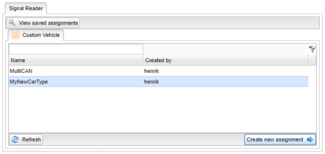Difference between revisions of "Signal Reader Assignment Wizard"
(Added some to creating a new assignemnt) |
(Added about trigger) |
||
| Line 9: | Line 9: | ||
Under the '''Measurements''' tab, see Figure 2, you are faced with a table of Measurement Setups and an information window. These measurement setups are the core of a signal reader assignment. They contain '''Triggers''' that activate and deactivate on certain conditions provided by the user. Each trigger can contain a '''Recorder''' that contains a list of certain signals that will be measured when the start condition for the respective trigger is met. | Under the '''Measurements''' tab, see Figure 2, you are faced with a table of Measurement Setups and an information window. These measurement setups are the core of a signal reader assignment. They contain '''Triggers''' that activate and deactivate on certain conditions provided by the user. Each trigger can contain a '''Recorder''' that contains a list of certain signals that will be measured when the start condition for the respective trigger is met. | ||
==== Trigger ==== | |||
To add a trigger to a measurement setup, click the '''Add trigger''' button for the respective measurement setup. This will create a new Trigger in the trigger table in the respective measurement setup and the information window will be filled with new settings for this trigger for you to add. | |||
Fill out the start and stop conditions for the trigger. This is easiest to do in the '''Edit expression''' window that you can get to by clicking one of the '''Edit''' buttons. To find a new signal to add a condition for, use the '''Add signal''' button. Here, you can browse all signals available for this assignment. Use the dropdown to browse signals from different can-busses and Wice generic internal signals. If you want to browse the signals currently in use in the assignment for the selected signal source, check the '''Search in assignment''' box. If you want more information about a signal, select it and click '''More info'''. When you have found the signal you want, double click it or select it and click '''Add signal'''. Now you can use the '''Operators''' list to add a condition for the signal, for example " > 0". When you are satisfied with the start condition, click '''Save''' to save the expression. | |||
==== Recorder ==== | |||
=== Editing an assignment === | === Editing an assignment === | ||
Revision as of 12:40, 31 October 2017
The Signal Reader Assignment Wizard can be found under the tab Assignment and allows the user to create new assignments for signal reader directly on the portal. This page will guide you through the basics of using the wizard.
Choosing a Signal Source
First, you must select a signal source to base your new assignment on. Today, only custom vehicle types can be used for this, see Figure 1. If you would like to edit the Custom Vehicle types or create a new one, this can be done by admins under the administration tab.
When you feel comfortable with which signal source you would like to use, double click it or select it and click Create new assignment.
Creating a new assignment
Now that you have chosen a signal source, you can start creating the assignment. The first tab that you are presented with is the Assignment global settings tab where you can add information about the assignment so that you can easily keep track of what this assignment is about. Creator and creation date are both automatically filled in and cannot be changed because of consistency.
Under the Measurements tab, see Figure 2, you are faced with a table of Measurement Setups and an information window. These measurement setups are the core of a signal reader assignment. They contain Triggers that activate and deactivate on certain conditions provided by the user. Each trigger can contain a Recorder that contains a list of certain signals that will be measured when the start condition for the respective trigger is met.
Trigger
To add a trigger to a measurement setup, click the Add trigger button for the respective measurement setup. This will create a new Trigger in the trigger table in the respective measurement setup and the information window will be filled with new settings for this trigger for you to add.
Fill out the start and stop conditions for the trigger. This is easiest to do in the Edit expression window that you can get to by clicking one of the Edit buttons. To find a new signal to add a condition for, use the Add signal button. Here, you can browse all signals available for this assignment. Use the dropdown to browse signals from different can-busses and Wice generic internal signals. If you want to browse the signals currently in use in the assignment for the selected signal source, check the Search in assignment box. If you want more information about a signal, select it and click More info. When you have found the signal you want, double click it or select it and click Add signal. Now you can use the Operators list to add a condition for the signal, for example " > 0". When you are satisfied with the start condition, click Save to save the expression.
